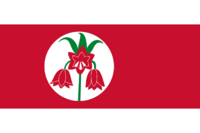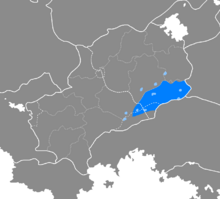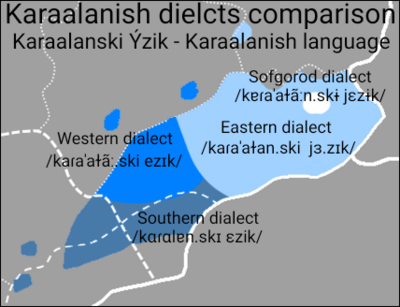Karaalani language: Difference between revisions
Native Qazh (talk | contribs) No edit summary |
Native Qazh (talk | contribs) No edit summary |
||
| Line 94: | Line 94: | ||
}} | }} | ||
The '''Karaalani language''' is a [ | The '''Karaalani language''' is a [placeholder]-{{wp|Slavic language|Slavic}} {{wp|Pidgin}} language, which arose from [placeholder] merchants and traveler going into whats modern day [[Monte Blanco]], [[Mustelaria]], and settling in the area. The language is co-official in the Karaalani region of [[Monte Blanco]], [[Mustelaria]], and the 4th most spoken langauge in [[Mustelaria]]. | ||
=Phonology= | =Phonology= | ||
Revision as of 11:34, 28 December 2021
This article is incomplete because it is pending further input from participants, or it is a work-in-progress by one author. Please comment on this article's talk page to share your input, comments and questions. Note: To contribute to this article, you may need to seek help from the author(s) of this page. |
| Karaalani | |
|---|---|
| Karaalan, Karaalanish | |
 Ethnic Flag of the Karaalani people | |
| Pronunciation | // |
| Native to |
|
| Region | Slavic Belt in Thuadia |
| Ethnicity | Karaalani Slavs |
Native speakers | L1: 17,980,000 L2: 1,200,000- FL: 25,000 |
Thuado-Thrismaran languages
| |
Early form | |
Standard forms | Eastern Karaalani
|
| Dialects |
|
| Govoric Script Protopolyash script | |
| Official status | |
Official language in |
|
Recognised minority language in |
|
| Language codes | |
| ISO 639-1 | KR |
| ISO 639-2 | KRA |
| ISO 639-3 | KRA |
 Distribution of the language Absolute majority >30% of native speakers | |
The Karaalani language is a [placeholder]-Slavic Pidgin language, which arose from [placeholder] merchants and traveler going into whats modern day Monte Blanco, Mustelaria, and settling in the area. The language is co-official in the Karaalani region of Monte Blanco, Mustelaria, and the 4th most spoken langauge in Mustelaria.
Phonology
Consonants
| Labial | Alveolar | Palatal | Velar | |||
|---|---|---|---|---|---|---|
| Plosive/ Affricate |
voiceless | p | t | t͡s | t͡ʃ | k |
| voiced | b | d | d͡z | d͡ʒ | ||
| Fricative | voiceless | f | s | ʃ | x | |
| voiced | z | ʒ | ɣ | |||
| Nasal | m | n | ||||
| Approximant | ʋ | l~ɫ | j | |||
| Rhotic | ɾ | |||||
Vowels
| Front | Central | back | |
|---|---|---|---|
| Close | i | u | |
| Mid | ɛ | ɤ | o |
| Open | a |
Writing System
Karaalani officially uses the Govoric script but it also has adapdet co-official Protopolyash and Latin forms.
| А а | Б б | В в | Г г | Д д | Е е | Ж ж | З з |
| И и | Й й | К к | Л л | М м | Н н | О о | П п |
| Р р | С с | Т т | У у | Ф ф | Х х | Ц ц | Ч ч |
| Ш ш | Щ щ | Ъ ъ | Ь ь | Ю ю | Я я |
| Order | 1 | 2 | 3 | 4 | 5 | 6 | 7 | 8 | 9 | 10 | 11 | 12 | 13 | 14 | 15 | 16 | 17 | 18 | 19 | 20 | 21 | 22 | 23 | 24 | 25 | 26 | 27 | 28 | 29 | 30 |
|---|---|---|---|---|---|---|---|---|---|---|---|---|---|---|---|---|---|---|---|---|---|---|---|---|---|---|---|---|---|---|
| Cyrillic upper case | А | Б | В | Г | Д | Е | Ж | З | И | Й | К | Л | М | Н | О | П | Р | С | Т | У | Ф | Х | Ц | Ч | Ш | Щ | Ъ | Ь | Ю | Я |
| Cyrillic lower case | а | б | в | г | д | е | ж | з | и | й | к | л | м | н | о | п | р | с | т | у | ф | х | ц | ч | ш | щ | ъ | ь | ю | я |
| Protopolyash upper case | Ⲁ | ⲂⲂ | Ⲃ | Ⲅ | Ⲇ | Ⲉ | Ⲋ | Ⲍ | Ⲏ | Ⲓ | Ⲕ | Ⲗ | Ⲙ | Ⲛ | Ⲟ | Ⲡ | Ⲣ | Ⲥ | Ⲧ | Ⲩ | Ⲫ | Ⲭ | Ⲯ | Ϫ | Ϣ | Ϣⲧ | Ϩ | Ⲓ | Ⲓⲩ | Ⲓⲁ |
| Protopolyash lower case | ⲁ | ⲃⲃ | ⲃ | ⲅ | ⲇ | ⲉ | ⲋ | ⲍ | ⲏ | ⲓ | ⲕ | ⲗ | ⲙ | ⲛ | ⲟ | ⲡ | ⲣ | ⲥ | ⲧ | ⲩ | ⲫ | ⲭ | ⲯ | ϫ | ϣ | ϣⲧ | ϩ | ⲓ | ⲓⲩ | ⲓⲁ |
| Latin upper case | A | B | V | G | D | E | Ž | Z | I | Y/J | K | L | M | N | O | P | R | S | T | U | F | H | C | Č | Š | Št | Ă | Y/J | YU/JU | YA/JA |
| Latin lower case | a | b | v | g | d | e | ž | z | i | y/j | k | l | m | n | o | p | r | s | t | u | f | h | c | č | š | št | ă | y/j | yu/ju | ya/ja |
| IPA sound | a | b | ʋ | ɣ | d | ɛ | ʒ | z | i | j | k | l | m | n | o | p | ɾ | s | t | u | f | h | t͡s | t͡ʃ | ʃ | ʃt | ɤ | ◌ʲ | ju | ja |
Grammar
Pronouns
Nouns
Gender
Modern karaalani has lost it's gender system, and only groups nouns into ones ending in a vowel and ones ending in a consonant.
Case & Number
Adjectives & Adverbs
Verbs
Tense, Aspect, Mood
Copula
Questions
Numerals
Dialects
Karaalanish has 4 recognized dialects, the (standart) Eastern, Western, Southern and Sofgorod dialects.
The Western and Southern dialects differ mainly from the Eastern and Sofgorod dialects by the fact they dont pronounce the /j/ in the letter Ѣ/Ⳉ/Ý, which in the standert Eastern dialect is pronounced as /jæ~jɜ/, and in Sofgorod as /jɛ/. The Southern dialect dosent pronounce the stress in double characters, like in the word 'Karaalanski' ('Karaalanish'), insted of (standart Eastern) /kaɾaˈaɫan.ski/ it becomes /kɑɾɑlan.skɪ/. It also always pronounces Л/Ⲗ/L as an /l/. The Western dialect has nasal vowels when followed after 'n', some epakers in the far west parts pronounce their r's like /ʁ/s, sum ppl consider it a seperate dialect, tho officially its recognized as an 'accent'. The Sofgorod dialect conbines nasalization with the the /n/s and pornounces most i's as /ɨ/s and has a lot of 'unstressing'.
Language examples
Lord's prayer
Following text shows Lord's prayer written in Karaalani
| Common language | Karaalani (Iraklic) | Karaalani (Protopolyash) | Karaalani (Latin) | |
|---|---|---|---|---|
| Our Father in heaven, | Оче наш, кѫто си нѥбо, | Ⲟϫⲉ ⲛⲁⲋ, ⲕⲓⲱⲧⲟ ⲥⲏ ⲛⲓⲉⲃⲃⲟ, | Oče naš, kyóto si nyebo, | |
| hallowed be your name. | да се свѥти йимем ти, | ⲇⲁ ⲥⲉ ⲥⲃⲓⲉⲧⲏ ⲓⲏⲙⲉⲙ ⲧⲏ, | da se svyeti yimem ti, | |
| Your kingdom come. | да дойде царстѡ ти, | ⲇⲁ ⲇⲟⲓⲇⲉ ϯⲁⲣⲥⲧⲃⲟ ⲧⲏ, | da doyde carstó ti, | |
| Your will be done, | да буде вѡля ти, | ⲇⲁ ⲃⲃⲩⲇⲉ ⲃⲱⲗⲓⲁ ⲧⲏ, | da bude vólya ti, | |
| on earth as it is in heaven. | како нѥбо, тако и земѫ. | ⲕⲁⲕⲟ ⲛⲓⲉⲃⲃⲟ, ⲧⲁⲕⲟ ⲏ ⲍⲉⲙⲓⲱ. | kako nyebo, tako i zemyo. | |
| Give us this day our daily bread | Нѥвний ни хлѣб ним дай нес | Ⲛⲓⲉⲃⲏⲓ ⲛⲏ ⲭⲗⳉⲃⲃ ⲛⲏⲙ ⲇⲁⲓ ⲛⲉⲥ | Nyewniy ni hlýb nim day nes | |
| and forgive us our debts, | и ни прости наши дългове, | ⲏ ⲛⲏ ⲡⲣⲟⲥⲧⲏ ⲛⲁⲋⲏ ⲇϩⲗⲅⲟⲃⲉ, | i ni prosti naši dălgove, | |
| as we also have forgiven our debtors. | како ние проставаме нашите длъжничеу. | ⲕⲁⲕⲟ ⲛⲏⲉ ⲡⲣⲟⲥⲧⲁⲃⲁⲙⲉ ⲛⲁⲋⲏⲧⲉ ⲇⲗϩϧⲛⲏϫⲉⲩ. | kako nie prostawame našite dlăžničeu | |
| And do not bring us into temptation, | И нѥ ним въвеждай ву изкушенѥ, | Ⲏ ⲛⲓⲉ ⲛⲏⲙ ⲃϩⲃⲉϧⲇⲁⲓ ⲃⲩ ⲏⲍⲕⲩⲋⲉⲛⲓⲉ, | I nye nim văvežday vu izkušenye | |
| but rescue us from the evil one. | но ним избави от Лъкави. | ⲛⲟ ⲛⲏⲙ ⲏⲍⲃⲃⲁⲃⲏ ⲟⲧ Ⲗϩⲕⲁⲃⲏ. | no nim izbavi ot Lăkavi. |
